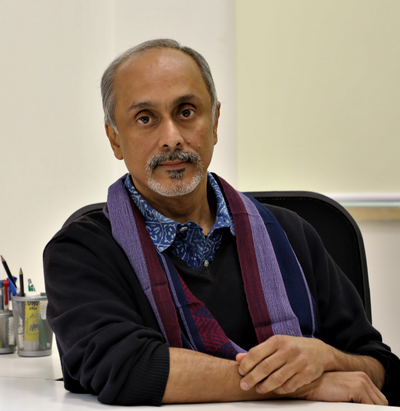
Dean, Research and Professor of Physics and Biology, Ashoka University
Ph.D. Indian Institute of Science, BangaloreGautam I Menon is a Professor of Physics and Biology at Ashoka University. He heads its Centre for Climate Change and Sustainability (3CS) and is currently Dean (Research) at Ashoka University. He was recently appointed a Commissioner on the Lancet Commission on “Strengthening the use of Epidemiological Modelling of Pandemic Diseases” and as a member of the WHO Technical Advisory Group on “Embedding Ethics in Health and Climate Change Policy.
He completed a BSc (Hons) in physics at St. Stephens College, Delhi, an MSc from IIT Kanpur, and a Ph.D from the Indian Institute of Science, Bangalore.
Prior to joining Ashoka, he was a Professor with both the Theoretical Physics and Computational Biology groups at the Institute of Mathematical Sciences (IMSc), Chennai, where he was also the founding Dean of the Computational Biology group. He joined IMSc following post-doctoral research and teaching at the Tata Institute of Fundamental Research in Mumbai and the Simon Fraser University in Vancouver, Canada. He was a Visiting Professor at the Mechanobiology Institute and the Department of Biological Sciences at the National University of Singapore between 2011 and 2013. He was an Adjunct Professor at the Tata Institute of Fundamental Research, Mumbai (2019-2022).
He serves on the scientific review committees of several international and national agencies, including the Human Frontier Science Program and the Wellcome Trust-DBT India Alliance, as well as on a number of national committees.
His research work, spread over approximately 100 papers, is in the broad areas of physics, biophysics and epidemiology. Currently, he works on a number of biophysical problems including nuclear architecture, axonal transport, collective cell migration and cell adhesion. The modelling of infectious disease and its implications for public policy is a long-standing interest. His group has developed BharatSim, India’s first ultra-large-scale agent-based model for disease spread. His research has been funded by the European Union, the BMGF, CEFIPRA and the WHO, as well as the DBT, DST and DAE in India. He has lectured in universities and scientific conferences around the world and in India, including in the USA, Canada, France, Germany, Switzerland, Singapore, the Netherlands and the UK.
He was awarded the Swarnajayanti Fellowship of the DST in 2005 and was named a DAE-SRC Outstanding Research Investigator in 2010. He was recognized as an Outstanding Referee by the American Physical Society in 2012, as well as as an Outstanding Reviewer by the UK-based “Reports on Progress in Physics” in 2016. He was a Shastri Fellow of the Shastri Indo-Canadian Institute in 2018. His named lectures include the Cockroft-Walton lecture, the G N Ramachandran Memorial Lecture and the K S Krishnan Endowment Lecture. He has been a speaker at, or organizer of, a number of bilateral initiatives, including the Indo-US Frontiers of Science, the Indo-US Frontiers of Engineering, the Indo-UK Frontiers of Science and the Indo-Israeli Workshops on Condensed Matter Physics. He was elected a Fellow of the National Academy of Sciences, India in 2019.
He has written extensively for the general public on topics at the interface of science and society, has appeared many times on TV and has been quoted across multiple other media, both nationally and internationally. A short video clip featuring his COVID-19 recommendations, made for the Ministry of Health and Family Welfare, has been viewed close to a million times.
1) Philip Cherian, Jayanta Kshirsagar, Bhavesh Neekhra, Gaurav Deshkar, Harshal Hayatnagarkar, Kshitij Kapoor, Chandrakant Kaski, Ganesh Kathar, Swapnil Khandekar, Saurabh Mookherje, Praveen Ninawe, Riz Fernando Noronha, Pranjal Ranka, Vaibhhav Sinha, Tina Vinod, Chhaya Yadav, Debayan Gupta and Gautam I Menon
BharatSim: An agent-based modelling framework for India
Online at: https://doi.org/10.1101/2023.06.15.23291292
2) Sargun Nagpal, Rakesh Kumar, Riz Fernando Noronha, Vedansh Priyadarshi, Supriya Kumar, Debayan Gupta, Ritvik Amarchand, Mudita Gosain, Hanspria Sharma, Gautam I Menon and Anand Krishnan
Seasonal variations in contact mixing in a rural population in north India: Implications for pandemic control
PLoS One 19(2): e0296483. (2024)
4) Vinod Kumar, Amruta Vasudevan, Keertana Venkatesh, Reshma Maiya, Parul Sood, Kausalya Murthy, Sandhya P Koushika and Gautam I Menon
Cargo crowding, stationary clusters and dynamical reservoirs in axonal transport
J. Cell Sci. 136 (12): jcs261223 (2023)
5) Reshma Maiya, Swagata Dey, Krishanu Ray and Gautam I. Menon
The interplay of active and passive mechanisms in slow axonal transport’
Biophys J., 122(2):333-345 (2023)
6) Farhina Mozaffer, Philip Cherian, Sandeep Krishna, Brian Wahl and Gautam I Menon
School Reopenings, Hybrid Immunity, and the Impact of the Omicron variant in India
Lancet Global Health South Asia, 100095(2022)
7) Dhiraj Kumar Hazra, Bhalchandra S Pujari, Snehal M Shekatkar, Farhina Mozaffer, Sitabhra Sinha, Vishwesha Guttal, Pinaki Chaudhuri and Gautam I Menon
Modelling the first wave of COVID-19 in India
PloS Comp Bio, 18(10): e1010632 (2022)
8) Farhina Mozaffer, Gautam I. Menon and Farah Ishtiaq
Exploring the thermal limits of malaria transmission in the western Himalaya
Ecology and Evolution, 12, e9278 (2022)
9) Siva Athreya, Gautam I Menon and Rajesh Sundaresan
COVID-19 Modelling for India and a Road-Map for the future
Communications of the ACM, 65, 11, 82-87 (2022)
10) Shakti N. Menon, P. Varuni, Freddy Bunbury, Devaki Bhaya and Gautam I Menon
Phototaxis in cyanobacteria: From mutants to models of collective behavior
MBio, Volume 12 Issue 6 e02398-21 (2021)
11) Philip Cherian, Sandeep Krishna and Gautam I Menon
Optimizing Testing for COVID-19 in India
PLoS Comp. Biol. 17(7): e1009126 (2021)
12) Ankit Agrawal, Nirmalendu Ganai, Surajit Sengupta and Gautam I. Menon
Non-equilibrium biophysical processes influence the large-scale architecture of the cell nucleus
Biophys. J. 118(9), 2229-2244 (2020)
